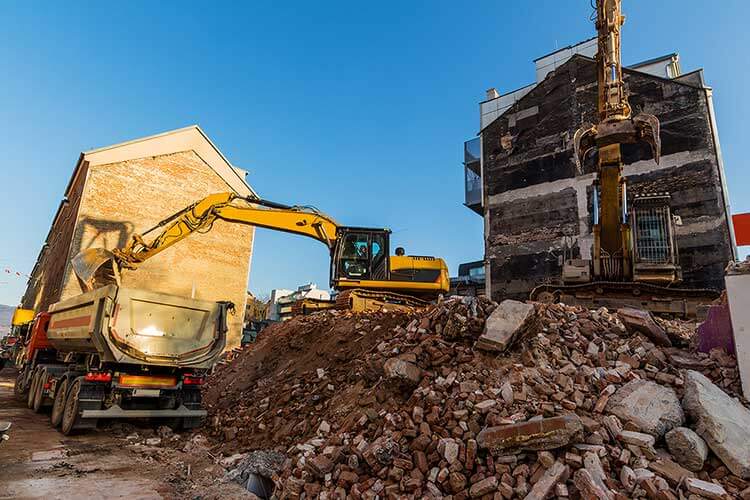 Waste reduction is not only about reducing the amount of waste produced. It is also about turning that waste into a resource. Funded by a United States Department of Agriculture grant, the year-long Construction and Demolition Waste Reduction Project focused on just that. Resources were developed, workshops were held and a webinar focused on promoting the efforts of reducing this waste.
Waste reduction is not only about reducing the amount of waste produced. It is also about turning that waste into a resource. Funded by a United States Department of Agriculture grant, the year-long Construction and Demolition Waste Reduction Project focused on just that. Resources were developed, workshops were held and a webinar focused on promoting the efforts of reducing this waste.
And throughout the project, we learned a lot. We learned about the need for more deconstruction contractors and in turn, the need for more salvage markets. Plus we learned about a variety of programs and organizations available with the similar goal of helping reduce this waste.
Deconstruction Over Demolition
When we began the project, we set out thinking part of the focus would be on demolition, but the project took us in a different direction - deconstruction. Did you know that 25 more jobs are created through deconstruction when compared to demolition? And according to the Deconstruction Institute, one year’s demolition debris is enough to build a wall about 30 feet high and 30 feet thick around the entire coast of the continental United States. Contractors are making a significant impact on the environment by deconstructing buildings. Not only does deconstruction keep usable materials out of the landfill, but it helps to reduce the need for new products.
The most significant finding as a result of the Iowa Construction and Demolition Waste Reduction Project is the state’s lack of contractors offering deconstruction services. Many projects in Iowa looking for deconstruction end in demolition because of this lack. “But through projects like this one (Iowa Construction and Demolition Waste Reduction Project), the word is spreading and so is demand for deconstruction services,” says Jenny Trent, Environmental Specialist at the IWRC. Projects that serve to educate Iowans on the value of salvaged building materials can help with a movement towards reducing salvageable building material.
This was reiterated by Dan Oswald at the Iowa Central Community College. “He cannot possibly get to all the requests for deconstruction,” continued Trent. With an abundance of requests, he stays focused on only deconstructing structures in which he knows will have old-growth, hardwood lumber which works best for the Eldora Project.
A Lack of Salvage Markets
The second thing learned through the project came directly from workshop attendee feedback and goes hand-in-hand with the lack of deconstruction contractors - a lack of salvage markets in the state. Having sources to take deconstruction materials is crucial to deconstruction gaining more traction throughout the state. These shops play a huge role in keeping materials out of the landfills. In 2013 alone, more than 80 tons of material was diverted from the landfill through donations to the Salvage Barn from renovation projects just from the University of Iowa and surrounding areas. Without these markets, all those materials will end up at the landfill instead of getting used again in a new build or remodel.
Salvage markets also fill the gap when historically accurate pieces are needed for renovation projects. Buildings and homes undergoing “period restoration” often have needs that can’t be found on today’s retail market so these shops are crucial to finding vintage and antique materials. Old door knobs, wood flooring, claw foot bathtubs; all these items and much more are available and often times, the quality of these items are outstanding when compared to items made today.
Jim Golden from the ReNew Reclaimed Building Materials store in Spirit Lake, IA says, "Salvage markets in Iowa are most popular among the do-it-yourself sector.” The biggest benefit being that these renovation materials cost less than purchasing new so as the DIY sector discovers the possibilities of buying from salvage markets in Iowa, not only will construction materials be diverted from the landfills but so will the consumption of natural resources used in producing new materials.
Available Services
Throughout the project, we were able to learn about and work with great organizations throughout the state that can help contractors, communities, individuals, and much more!
Awareness is Key
Similar to many environmental issues, awareness is key. Awareness of the waste reduction benefits of deconstruction can lead to more requests for this type of service over demolition. With more requests, a greater need for more salvage markets within a reasonable proximity to these projects will arise.
IWRC's Iowa Construction and Demolition Waste Reduction Project is funded by the United States Department of Agriculture. This material is based upon work supported under a grant by the Rural Utilities Service, United States Department of Agriculture. Any opinions, findings, and conclusions or recommendations expressed in this material are solely the responsibility of the authors and do not necessarily represent the official views of the Rural Utilities Service.
The Iowa Waste Reduction Center and the University of Northern Iowa are an equal opportunity provider and employer.

